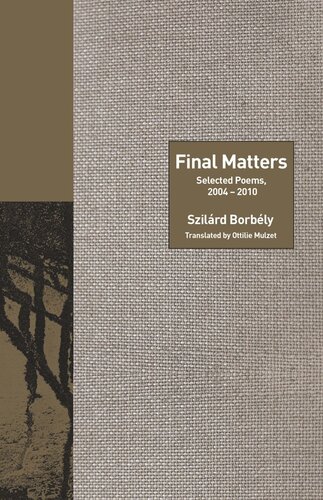

Most ebook files are in PDF format, so you can easily read them using various software such as Foxit Reader or directly on the Google Chrome browser.
Some ebook files are released by publishers in other formats such as .awz, .mobi, .epub, .fb2, etc. You may need to install specific software to read these formats on mobile/PC, such as Calibre.
Please read the tutorial at this link: https://ebookbell.com/faq
We offer FREE conversion to the popular formats you request; however, this may take some time. Therefore, right after payment, please email us, and we will try to provide the service as quickly as possible.
For some exceptional file formats or broken links (if any), please refrain from opening any disputes. Instead, email us first, and we will try to assist within a maximum of 6 hours.
EbookBell Team

4.7
36 reviewsAn award-winning translator presents selections from the haunting final volumes of a leading voice in contemporary Hungarian poetry
Szilárd Borbély remains one of the most celebrated writers to emerge from post-Communist Hungary. Before his suicide in 2014, he received numerous awards in his native country, including the prestigious Attila József prize. In this volume, acclaimed translator Ottilie Mulzet reveals the full range and force of Borbély’s verse by bringing together generous selections from his last two books, Final Matters and To the Body. The original Hungarian text is set on pages facing the English translations, and the book also features an afterword by Mulzet that places the poems in literary, historical, and biographical context.
A scholar as well as a poet, Borbély weaves Hungarian folk songs, classical myths, Baroque hymns, and Christian and Jewish liturgy into his work. In her afterword, Mulzet calls this collection “a blasphemous and fragmentary prayer book … which challenges us to rethink the boundaries of victimhood, culpability, and our own religious and cultural definitions.” Final Matters, which was written in the aftermath of the murder of Borbély’s mother, is an extended meditation on death, sacrifice, and violence. In his final published work, To the Body, Borbély draws on narratives of women’s lives—from Internet chat rooms, Holocaust survivors’ testimonies, and the Golden Legend. Inhabiting the female voice, the poems offer glimpses of the luminous amid nearly bestial pain.
Theologically and philosophically searching yet relentlessly concrete and fully embracing the condition of late modernity, this is a moving collection that demonstrates why Borbély belongs in the company of great Central European writers.